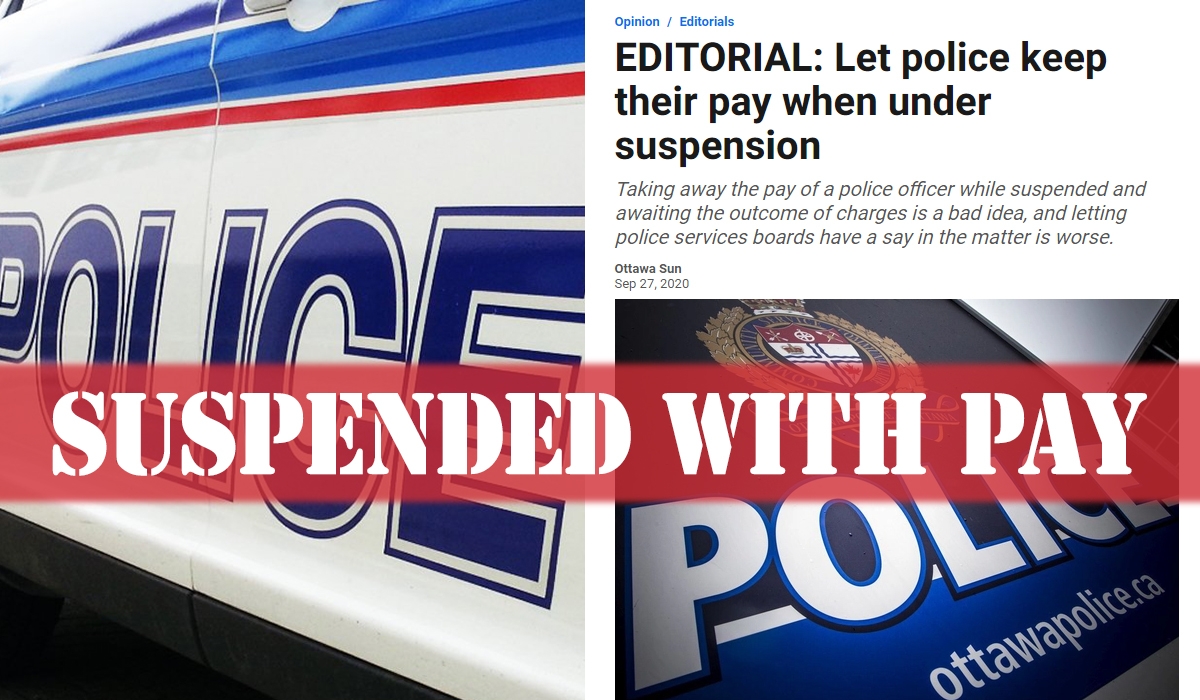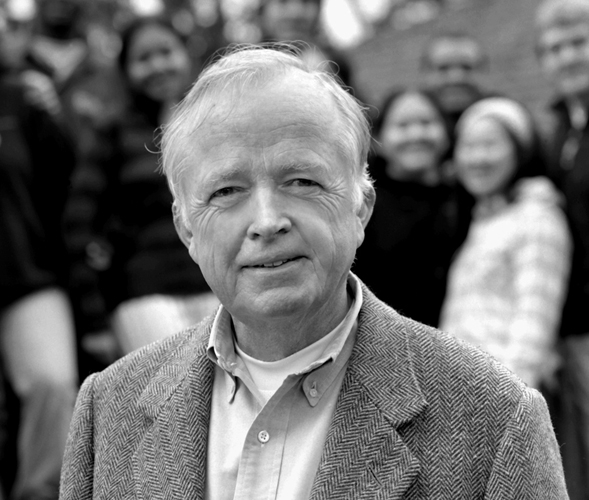
The Ottawa Sun’s preposterous ‘editorial on police’ is proof that stupid exists
The September 27, 2020 editorial by the Ottawa Sun titled ‘Let police keep their pay when under suspension’ defies logic. Three-quarters of their editorial focuses on the fact that we have rampant and widespread police misconduct in the Ottawa Police Service. As they say ten police officers have been suspended this year. The justification they offer for not suspending police officers without pay is based on a simplistic rationale namely that police have such a difficult job. As the editorial states: ‘We can’t have them failing to act because they’re afraid they won’t be able to pay the bills if there’s a subsequent probe and suspension.”
It is true that the job of a police officer is different from other jobs in the private sector. But unlike other jobs, taxpayers pay for a police officer’s training and salary and they are hired under the Police Services Act of Ontario. Police officers have enormous legal powers under the Criminal Code of Canada that no other citizen possesses when it comes to depriving other citizens of their freedoms and in some cases their lives. However, unlike citizens, police officers take a sworn oath of office. Of what value is a sworn oath of office if they can flagrantly break the law and then suffer no sanctions for their actions. In fact, a strong argument can be made that police officers are well aware of the fact that if they engage in discreditable conduct and are caught and convicted that the penalties will be meaningless.
Cops know they can’t be easily fired, and they also know that if they are investigated under the Police Services Act of Ontario or the Criminal Code of Canada that they cannot be suspended without pay. There is therefore a distinct possibility that having this knowledge may even be contributing to the widespread police misconduct and malfeasance that we are witnessing not just in Ottawa but with police officers across the province. For some cop’s suspension with pay is like paid leave. Several years ago, an Ottawa police officer was caught on camera bashing an inebriated woman’s head on the back of his police cruiser. He was suspended with pay and during his hiatus from policing he used the time to further his education by attending the University of Ottawa all on the taxpayer’s dime. If that is not a sweetheart deal, I don’t know what is? In fact, Ontario is an outlier because its the only province that continues to suspend police officers with pay.
To suggest that police officers should not be suspended without pay when they commit egregious crimes and acts of discreditable conduct because they have such a difficult job requires scrutiny based on the facts. Surveys comparing mortality rates of occupations clearly shows that police do not even make the list of the top ten most dangerous jobs in our society. The idea that we need to make excuses for police malfeasance because their work is so dangerous is nothing more than inaccurate and misinformed nonsense. However, over the years police associations have effectively used this myth to augment salary increases at the bargaining table. Research evidence clearly shows that 80 per cent of what police do on the job deals with order maintenance functions and has absolutely nothing to do with crime. Of the remaining twenty per cent, less than .05 per cent involves dealing with violent people and crime.
We are not talking about suspending police officers without pay for minor offences under the Police Services Act of Ontario and the Criminal Code of Canada. Consider the following officers who have been suspended with pay in the Ottawa Police Service and ask yourself if it makes any sense that they should be paid when they are facing such serious charges. Does it make any sense that these people should continue receiving salaries when any other citizen working the in the private sector or even in the public sector would be fired for such conduct?
For example, in March 2020, the Deputy Chief of the Ottawa Police Service, Uday Jaswal, was suspended and charged with six counts of sexual harassment and a charge for assault of a civilian employee by the Ontario Civilian Police Commission. In mid-April 2020, three Ottawa Police Officers were charged by the RCMP with providing the locations of traffic collisions to preferred tow-truck operators in exchange for cash payouts. The officers included veteran constable Hussein Assad, Constable Kevin Putinsky and Constable Andrew Chronopoulos and they are all facing multiple charges for breach of trust under the Criminal Code of Canada. Hussein Assad was also charged by the RCMP with secret commissions or taking a kickback, obstruction of justice, providing access to confidential police databases and conspiring to commit break and enter and theft. In fact, Assad is alleged to have been planning an ATM heist at the time of his arrest according to the RCMP.
In July 2020, an Ottawa police officer Constable Carl Keenan was charged and found guilty of assault causing bodily harm in relation to an incident in December 2017 while he was off duty. He was charged by the MRC des Collines following an assault in Gatineau of a woman with whom he had been romantically involved. He was suspended with pay. On August 6, 2020, an Ottawa cop was charged with possession of a weapon for committing an offence and uttering threats to cause death in a domestic incident. His name could not be released to protect the victims identify. On August 31, 2020, Constable Nermin Mesic who threatened to kill his former tenant, sell the man’s child to pay his late rent and ‘spill blood’ was demoted for a year. Mesic was charged on February 7, 2016 with uttering threats, assault, forcible confinement, and intimidation. He was under suspension with pay until it was lifted at the end of July 2020. What is interesting is that Constable Mesic was previously convicted of discreditable conduct and insubordination in 2009 for slapping a youth twice across the face during questioning, kicking him and grabbing his throat before throwing him to the ground. In early September 2020, Constable Kevin Benloss of the Ottawa Police Service was suspended for more than two years following two different investigations in the last two years. The Ottawa police officer is alleged to have raped a police colleague in 2011. Just recently, Constable Jesse Hewitt was suspended and charged with nine counts of discreditable conduct under the Police Services Act of Ontario. The officer is alleged to have filmed vulnerable women with mental health issues in his custody and mocked them in the videos that he circulated to other police officers.
The public place a lot of confidence and trust in the people who join police agencies. When that trust is broken there are at least two possibilities that could be considered. The first course of action could be to suspend the officer without pay. The money could be placed into a trust account and once the case has been resolved in court and if the officer is acquitted, the money could be returned to the officer. Another option would be to suspend the officer with pay but if the officer were convicted the officer’s pension could be confiscated and returned to the Crown. The excuse offered by the Ottawa Sun for not suspending officers without pay because it may prevent them from doing their jobs would only be valid if their job was taking bribes, uttering death threats, sexually assaulting colleagues or mocking the mentally ill.
In fact, suspending police officers without pay may have the positive and more desirable effect of preventing them from engaging in reckless and deviant behaviour towards the public. We need police officers to use their training and brain when they interact with the public and if they are aware that their actions will be investigated that is in and of itself a good thing because it may prevent them from engaging in behaviour with the public that not only is discreditable conduct but also a criminal offence, and in my view that’s a good thing.
Darryl T Davies is a criminology professor in the department of sociology and anthropology at Carleton University.









